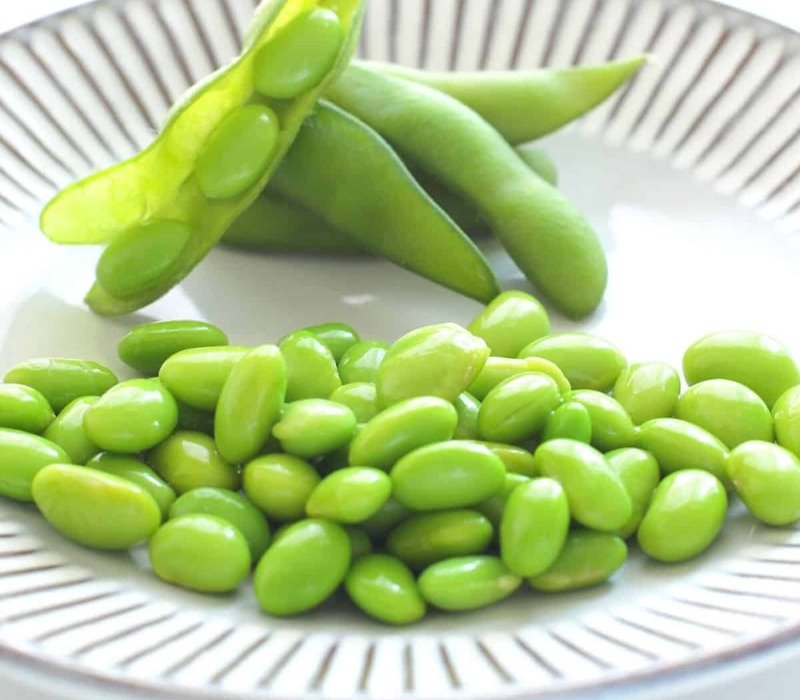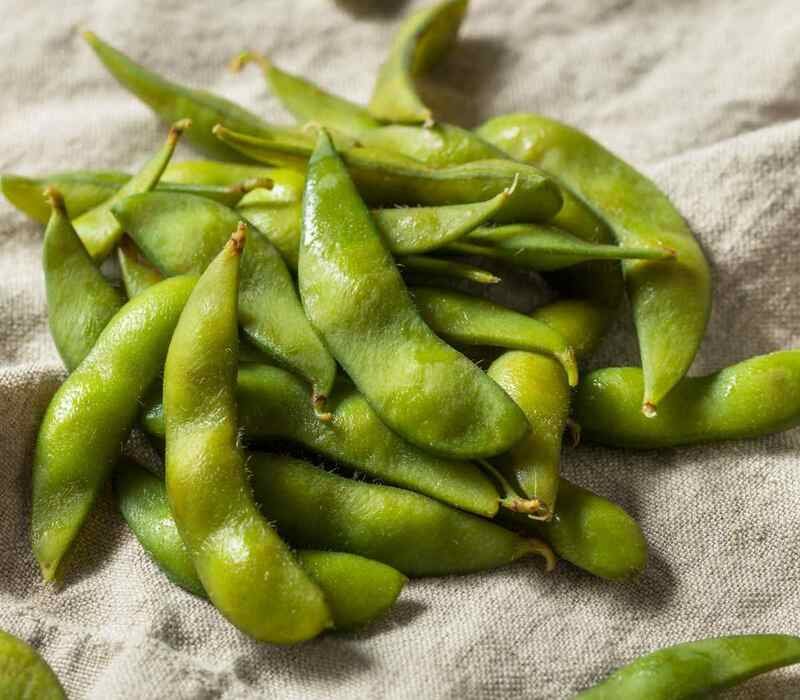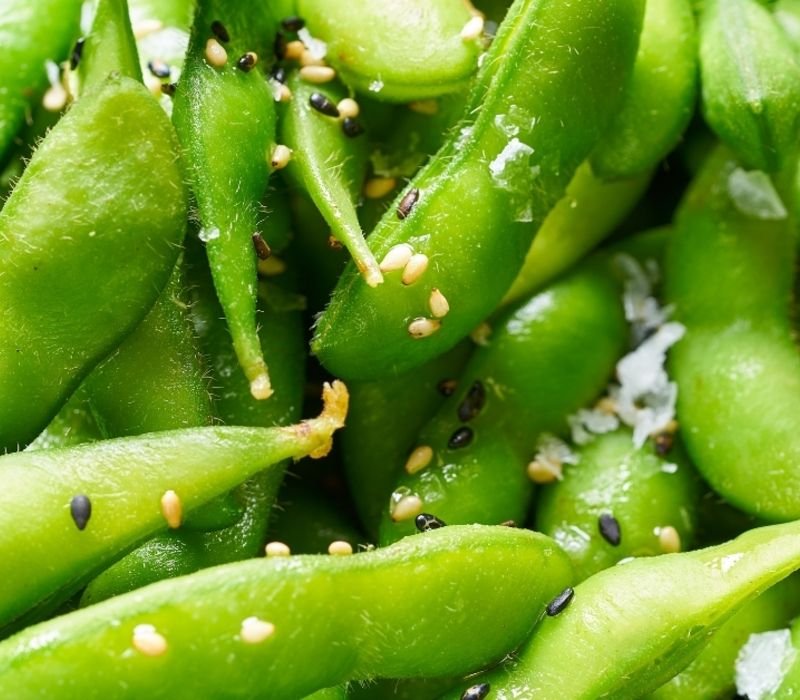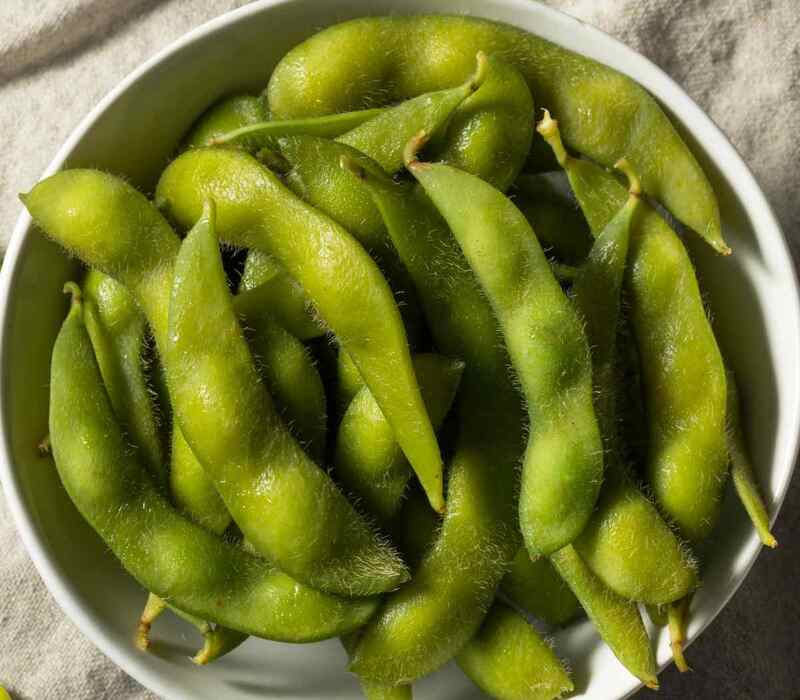Looking for a delicious and nutritious snack that fits your keto diet? Look no further than is edamame keto! Did you know that edamame is just soybeans that haven’t fully developed?
That’s right edamame are immature soybeans that are commonly found in dishes originating from East Asia. Edamame are crunchy, tasty, green veggies, but are they keto?
In this article, You’ll explore the nutritional benefits of edamame, how it fits into a keto diet, and share some tasty recipes to help you incorporate this tasty snack into your keto meal plan.
Page Contents
Edamame Keto is a Unique Legume
See what I mean? Edamame beans are immature soybeans that are typically steamed or boiled in their green shell.
They’re considered a legume, a category that also includes beans, lentils, and chickpeas. Legumes, including soy-based foods, are usually thought of as being too carb-rich to be part of a keto diet.
But, edamame beans are unique. They have ample amounts of dietary fiber — which helps compensate for their overall carb content. And the best part?
This is because dietary fiber is a type of carb that your body doesn’t digest. Instead, it moves along your digestive tract and adds bulk to your stool.
A 1/2-cup (75-gram) serving of shelled edamame has 9 grams of carbs. Yet, when you subtract its 4 grams of dietary fiber, it yields just 5 grams of net carbs.
The term net carbs refer to the carbs that remain after subtracting dietary fiber from total carbs.
While edamame can be added to your keto diet, keep your portion size to a modest amount of 1/2 cup (75 grams) to help sustain ketosis. I have also written an article on Lima Beans vs Edamame: Which is Better For You?
What is Edamame Keto?

Do you know what it is? Edamame is an appetizer that people in Asia- mostly across China and Japan, make out of cooked green soybeans. The green soybeans are boiled, steamed, or fried, and then slightly salted to be served as a pre-meal delicious snack.
The use of soy and soy products on the keto diet is an already controversial topic. The reason is that soybeans are legumes and they contain a large number of carbohydrates.
But, most of the time you consume soy in its mature form. Mature soybeans are taken out of the pod and then they undergo processing, such as baking or boiling to make tofu or tempeh.
But, that is not the case with edamame. You consume edamame in its immature form, with the beans still in their pods, which do not contain any alkaloids.
The immature soybeans contain less net carbs and more fiber in comparison with mature soybeans. The taste of edamame is similar to peas, and also their nutritional values are very similar. You can also read more about The Best Edamame For Salads That Everyone Will Love.
Is Edamame Keto?
For the most part, yes! A 100g serving of edamame only has 3.6g of net carbs. Most people should be able to fit a serving or two into their ketogenic diet. Well, sounds good, right?
Of course, with any food, if you have any intolerances or specific reasons you are avoiding soy, consume edamame with caution. You can get more from this video.
Edamame Keto Nutritional Facts
| Fat | 7.57 grams |
| Calories | 140 kcal |
| Protein | 11.54 grams |
| Total Carbs | 8.63 grams |
| Fiber | 5 grams |
| Net Carbs | 3.63 grams |
Is Edamame Healthy?

Even though it is a legume, edamame is a unique food. It is rich in plant-based proteins, and fiber and is low in carbs.
Additionally, edamame is not only rich in protein, but its protein is a whole protein- meaning that it contains all the essential amino acids your body needs to function. My studies have even found a correlation between consuming soy protein, lowered LDL cholesterol, and risk for cardiovascular diseases.
Another benefit of consuming edamame is its low glycemic index and low insulin response. This makes edamame even more unique in comparison to other legumes which tend to have a higher glycemic index.
Edamame is also rich in fiber, which has a wide range of health benefits such as lowering the risk of developing coronary heart disease, diabetes, obesity, stroke, hypertension, and certain gastrointestinal diseases. Increasing fiber intake can also help lower blood pressure and serum cholesterol levels.
Apart from fiber and protein, edamame is also rich in essential vitamins and other micronutrients such as folate, iron, vitamins K and C, and potassium.
Edamame also has the typical side effects that all legumes can have on some people, which are GI tract issues such as constipation, diarrhea, and stomach cramps.
Another important thing to take into consideration when deciding if edamame is a food you would like to consume is how it is prepared. Generally, boiled and steamed edamame will be healthier, while fried edamame is less healthy. You can add some virgin oil (coconut, olive) to boiled or steamed edamame for an additional fat boost.
Edamame Keto Fixings
14 ounces frozen edamame (1 bag)
1 tablespoon avocado oil
2 garlic cloves, minced
3 tablespoons soy sauce or Tamari or coconut aminos
3 teaspoons sambal oelek
Kosher salt to season
How to Make?
Prepare edamame: Cook edamame according to bag instructions (we usually cover the bowl with a plate and microwave for 4 ½ minutes).
Make the sauce: Heat oil in a skillet over medium heat. When warm, add minced garlic and briefly sauté for 30 seconds, until fragrant. Add soy sauce and sambal and heat a little longer. Stir in cooked edamame and toss to coat.
Serve: Serve edamame in a bowl with pan sauce drizzled over the top. Sprinkle with kosher salt as desired. Serve immediately. Look Tasty!
Edamame Keto Health Benefits

Edamame Keto May Lower Cholesterol
Observational studies have linked abnormally high levels of cholesterol with an increased risk of heart disease.
One review concluded that people who ate an average of 25 grams of soy protein per day had a reduction in low-density lipoprotein cholesterol by approximately 3-4%.
It’s unclear if these small to modest changes in cholesterol levels translate into a lower risk of heart disease.
Despite these uncertainties, the Food and Drug Administration (FDA) approves health claims for soy protein in the prevention of heart disease.
In addition to being a decent source of soy protein, edamame is rich in healthy fiber, antioxidants, and vitamin K.
These plant compounds may reduce the risk of heart disease and improve the blood lipid profile, a measure of fats including cholesterol and triglycerides. Another on The Best Edamame Seeds Good For You.
Edamame Keto May Promote Healthy Blood Sugar Regulation
Those who eat lots of easily digested carbs, such as sugar, regularly may be at an increased risk of chronic disease.
This is because a diet high in rapidly digested carbohydrates leads to high post-meal blood sugar levels and poor blood sugar regulation, which could increase the risk of developing health conditions like type 2 diabetes.
Like other beans, edamame does not excessively raise blood sugar levels.
It’s low in carbs, relative to protein and fat. It also measures a very low glycemic index, a measure of the extent to which foods raise blood sugar levels.
This makes edamame suitable for people with diabetes.
High in Protein
Getting enough protein is crucial for optimal health.
Vegans and those who rarely eat high-protein animal foods may need to pay special attention to what they eat daily.
One concern is the relatively low protein content of many plant foods. However, there are a few exceptions.
For instance, beans are among the best plant-based protein sources. They are the cornerstone of many vegan and vegetarian diets.
A cup (160 grams) of cooked edamame provides around 18.4 grams of protein.
Additionally, soybeans are a whole protein source. Unlike most plant proteins, they provide all the essential amino acids your body needs.
You Can Buy Best Selling Products Like
Conclusion
Edamame is also low-carb and it has a GI of 20 which is classified as a low GI. Edamame is also rich in many essential micronutrients. If you are a strict keto dieter, edamame is not recommended, because it is a legume.
But, if you are not a strict keto dieter or you are on a low-carb diet and you want to enjoy some edamame, then you can, but make sure you control how much you consume. Also, Let me know in the comment section what you think about it.
In a serving of 100 grams, edamame contains 4 grams of net carbs.
No, edamame isn’t rigorously keto-accommodating as it is a vegetable. It likewise takes up 25% of a severe keto calorie counter’s everyday carbs, so it isn’t the most proficient method for utilizing your carbs.
One cup of edamame has 8 grams of fiber, a noteworthy 17 grams of protein, and 180 calories, and can keep you feeling full and fulfilled for a long time, making it an incredible food to assist you with arriving at your weight reduction objectives.







